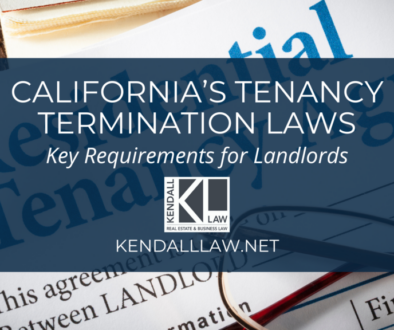Law updates that may affect REALTORS®
As a real estate professional, it’s in your best interest to be aware of the latest legal updates and laws that can impact your clients and the way you conduct business. Kendall Law is here exactly for this reason.
Here are some of the latest laws that impact a wide variety of areas ranging from legal liability in employment, sexual harassment, HOA requirements, fair housing and real estate licensing.
We’re always here ready to help you navigate the legal requirements to help realtors, agents and brokers run a sound real estate business.
Building Permits
- A building permit remains valid despite changes in the building code as long as work is commenced within 12 months after issuance.
- If there is no record of a building permit being issued for construction of an existing residential unit, the local building permit enforcement official can: 1) determine the date of construction of a residential unit, 2) apply the building standards in effect at that date of construction, and 3) issue a retroactive building permit.
Sexual Harassment
- Real estate agents’ liability for sexual harassment has been expanded so that an accuser has greater protections and less burden of proof — even if a business, service, or professional “relationship”does not presently exist.
- For example:
- Professional service businesses can now be liable even absent an employer- employee relationship. Examples of professional relationships where liability for claims of sexual harassment may arise, are an investor, elected official, lobbyist, director, producer, attorney, holder of a master’s degree in social work, real estate agent, or real estate appraiser.
- An accuser no longer has to prove that he or she was not able to easily terminate the relationship.
Common Interest Developments
- Frequency of financial review required by law is now at least once a month (formerly at least once a quarter) and adds a requirement to review the check register, monthly general ledger, and delinquent assessment receivable reports.
- It provides some flexibility in this monthly review requirement by allowing an individual board member—for example, the treasurer—to review these financial documents so long as the board ratifies that review at the next board meeting.
- The HOA is now required to maintain bond coverage for its directors, officers, and employees in a minimum amount equal the combined amount of the reserves of the HOA and total assessments for three months.
- A managing agent cannot transfer money from a bank trust greater than ten thousand dollars ($10,000) or 5 percent of an association’s total combined reserve and operating account deposits, without prior written consent.
Data Privacy - The California Consumer Privacy Act (“CCPA”)
- Starting January 1, 2020 – changes to the law regarding consumers personal information will be expanded. For instance, a consumer will have the right to request that a business (that meets a certain threshold of revenue/size) delete their personal information and prevent the sale of it.
- However, if the law is violated a consumer does not have the right to bring a civil lawsuit. Actions must be brought through the Attorney General.
Revocable Transfer on Death Deed
- The Revocable Transfer on Death Deed no longer requires the statutory FAQ to be recorded as part of the deed.
Employment Law (Discrimination and Harassment)
- Prohibits an employer from requiring a potential employee to sign a release or non-disparagement agreement as a condition of employment.
- The definition of harassment now includes any type of harassment, not just sexual, for which an employer may be responsible when committed by a nonemployee.
- With certain exceptions, an employer cannot, in exchange for a raise or bonus, or as a condition of employment or continued employment, require the execution of a release of a claim or right under Fair Employment and Housing Act or other document that denies the employee the right to disclose information about unlawful acts in the workplace, including, but not limited to, sexual harassment.
Inquiry of Salary Expectation
- Employers may inquire into an applicant’s employment salary expectation for the position being applied for.
- Employers may make compensation decisions based upon an employee’s current salary as long as any wage differential resulting from that compensation decision is justified is justified by one or more specified factors including seniority or merit.
Financial Disclosures
- Lenders must provide loan modifications documents in the language that was used in the negotiation if the terms of negotiation were conducted in Spanish, Chinese, Tagalog, Vietnamese, or Korean.
Fair Housing
- Public agencies must administer programs to further fair housing. The Planning and Zoning Law requires each city and county to prepare and adopt a general plan that contains certain mandatory elements, for achieving the goals and objectives of the housing element, to affirmatively further fair housing.
Homeowner Bill of Rights
- Permanently restores the pre-2018 version of the Homeowner Bill of Right laws that had expired on January 1, 2018
Real Estate Licensing
- Applicant for a Real Estate license cannot be required to disclose citizenship or immigration status. A licensing board, including the DRE, cannot deny licensure to an otherwise qualified and eligible individual based solely on his or her citizenship status or immigration status.
- A board, including the DRE, can look back seven years to consider a criminal conviction in denying a license, but only if the crime is substantially related to the qualifications, functions, or duties of the business or profession for which the application is made.
- A board may not deny a license to a rehabilitated applicant or one whose criminal record has been expunged.
Author: Eileen Kendall





